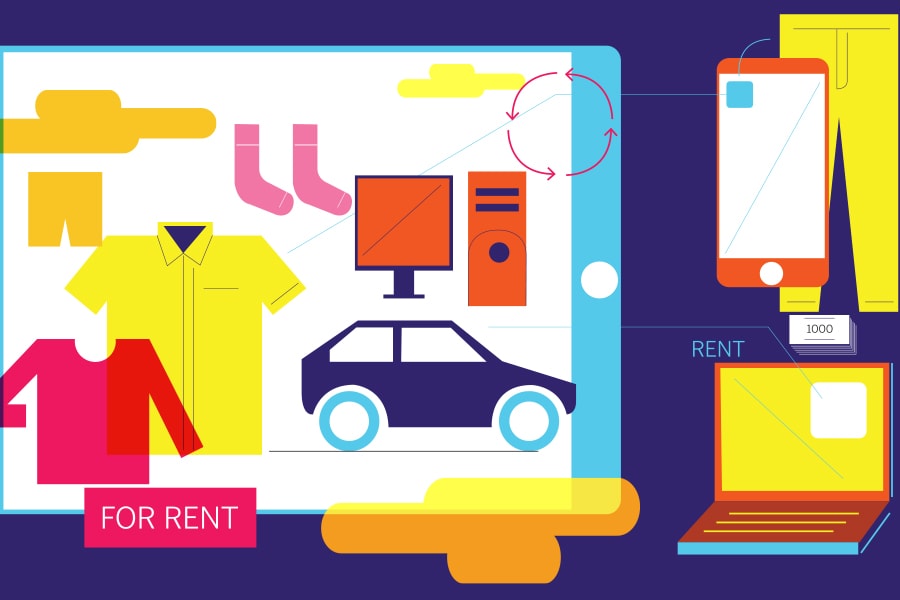2020s: Sharing assets will be the new normal
Millennials prefer experiences over assets, and believe that sharing makes for a compelling proposition, writes Awfis founder and CEO Amit Ramani


 Illustration: Sameer Pawar[br]In 2008-2009, a few startups emerged to popularise the concept of the sharing economy. The concept was simple: If you have something lying idle, list it, and people will rent it out. By 2016, nearly 45 million people in the US were participating in the sharing economy.
Illustration: Sameer Pawar[br]In 2008-2009, a few startups emerged to popularise the concept of the sharing economy. The concept was simple: If you have something lying idle, list it, and people will rent it out. By 2016, nearly 45 million people in the US were participating in the sharing economy. It is an increasingly famous concept in modern India as well. Millennials are known to access products and services with just the click of a button. And the profusion of smartphones and gadgets coincided with the dramatic growth of sharing services.
It is an increasingly famous concept in modern India as well. Millennials are known to access products and services with just the click of a button. And the profusion of smartphones and gadgets coincided with the dramatic growth of sharing services.
It so rightly fits the millennial way of living. Millennials, who prefer spending on experiences over assets, believe that sharing, rather than owning, makes for a compelling proposition. A massive millennial population in India is feeding the idea of sharing and optimising the use of assets and skills. Projections put the sector globally at $335 billion by 2025, and the growing number of companies offering full service options are a testament to this growth and the shift in socio-economic behaviour of urban India.
The sharing economy banks on the concept of collective use of community resources and technology to shape business models, and startups are riding the wave of collaborative consumption. Many startups are leveraging the concept of sharing or renting and running their operations successfully. Modern technology decreases operating services expenses and anticipates customer requirements. There are multiple global companies operating under this model, helping millions of people rent rooms, lease offices, get business loans, and share houses, cars, bicycles, clothes, skills, and so on. They have a typical rating or review system, so that people on both sides of the transaction can trust each other.
Additionally, products and services are offered at affordable costs with no long-term commitments. These qualities instantly resonate with millennials. As a result, companies such as Ola, Airbnb and Rentomojo are dominating their respective spaces. Cars, homes, furniture and office spaces are now used on a time-limited per-use basis rather than requiring the expense and burden of ownership.
"The 2010s were a warm up in gig economy": UrbanClap"s Varun Khaitan
The sharing economy also brings a new phenomenon: Coworking spaces. Shared workspaces pose as the perfect example of the shared economy in two ways: First, by providing access to shared physical assets like an office infrastructure, and second, by sharing of intangible assets like collaboration and mentorship.
Coworking spaces make it seamless for companies and young entrepreneurs to resist long leases of commercial office spaces. They provide many of the amenities of traditional offices but place a much greater emphasis on community building and experience for members.
The inherently flexible and collaborative nature of coworking spaces has garnered immense success from its large base of clientele, ranging from not only small and medium enterprises (SMEs) and startups but also large corporations, multinational companies and freelancers.
The shared workspace sector has boomed in the last two to three years and the market is expected to grow rapidly over the next few years. However, with the rising trend of shared workspaces, the coworking industry has also witnessed an increase in the number of players in the segment. The highly competitive sector has seen a few uncertainties recently however, these will be short-term. These developments would have repercussions on the industry and investor sentiments too, but will definitely be shortlived.
"The definition of travel is changing": Oyo"s Ritesh Agarwal
The coworking sector has disrupted the commercial real estate sector, and is one of the major drivers fuelling its growth. With the emerging workspace ecosystem, technology plays an integral role in the sector’s growth, making coworking spaces the new normal. Innovations in technology have transformed the workplace where employees can collaborate, communicate and connect with each other, thereby boosting morale and increasing productivity.
Soon, gadgets such as laptops and smartphones will be replaced with audio activated systems, wearable technology, including wearable glasses, embedded chips, and wrist devices connected with the Internet of Things (IoT), ensuring seamless connection between work surfaces and individuals. The capability of devices to understand an individual’s preferred work style will provide customised data that will help create workplace solutions according to individual preferences.
The sharing economy’s growth has dazed everyone. It is a trend that is here to stay, as it is a perfect balance of cost-saving and better infrastructure that benefits both parties in the business.
While lessors earn from products that lie unused, lessees utilise a product without having to spare a huge capital for something they would require sparingly. It also entices millennials to postpone or even avoid ownership of a product. As the country is experiencing massive growth and development, the model for collaborative goods and services will branch out to newer markets and pave a way for financial freedom and entrepreneurial success.
With the evolution of technology and innovations, shared-economy models will continue to expand. Experience precedes ownership in today’s time and age, hence the sharing economy will definitely form an integral part of the Indian growth journey in the next three to five years.
First Published: Jan 07, 2020, 17:13
Subscribe Now